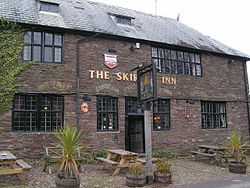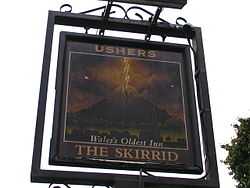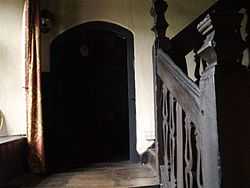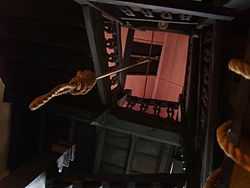The Skirrid Mountain Inn
| The Skirrid Mountain Inn | |
|---|---|
 | |
| General information | |
| Location | Llanfihangel Crucorney, Monmouthshire, Wales, United Kingdom |
| Coordinates | 51°52′49″N 2°58′50″W / 51.88028°N 2.98056°W |
The Skirrid Mountain Inn is a public house in the small village of Llanfihangel Crucorney, just a few miles north of Abergavenny, Monmouthshire, Wales. Perhaps the oldest pub in Wales, it is listed in chronicles from 1100.[1] Owain Glyndŵr is said to have rallied his forces in the cobbled courtyard in the early 15th century before raiding nearby settlements sympathetic to the English king, Henry IV.
The first floor of the inn was reputedly used as a Courtroom where capital punishment was imposed for certain offences, including sheep stealing. Local legend has it that as many as 180 convicted criminals were hanged, some possibly from an oak beam over the well of the staircase outside of the Courtroom. Markings, possibly from rope marks, still exist on the staircase wood.
Claims to fame




The Skirrid Mountain Inn is one of the oldest pubs in Wales with a history dating back over 900 years.[2]
Legend has it that the inn was used as a rallying point for local supporters of the Welsh Revolt against the rule of Henry IV, the uprising being led by Owain Glyndŵr. In the early 15th century he is said to have personally rallied his troops in the cobbled courtyard before raiding nearby settlements sympathetic to the English.
It is believed that the first floor of the inn was once used as a Court of Law and over the period of a great many years, as many as 180 prisoners were adjudged guilty of crimes serious enough to warrant the sentence of death by hanging, a sentence that was carried out at the inn itself, the last case of capital punishment purportedly taking place sometime prior to the death of Oliver Cromwell (1599–1658).
It also claims to be the home of several ghosts or spirits as well as the scene of numerous supernatural occurrences or paranormal activities. Indeed the reputation of the inn is such that it has merited the attendance of a number of paranormal investigators over the years, including the Midlands' Ghost Hunt company, Eerie Evenings, who have gone on record in the past to say that it is one of the most paranormally active venues they have ever investigated.[3]
The inn has been featured on TV's Extreme Ghost Stories and Most Haunted with Yvette Fielding. Possibly as the result of comments made by Derek Acorah, a former star of the show and a professed Medium, while filming was taking place at the inn, a popular belief has arisen that the infamous Judge Jeffreys heard cases at the Court.
There is no readily available documentary evidence to show that Jeffreys ever sat in judgement at the inn, however, during his career he did deal with cases in the area from Chester to as far south as Montgomeryshire (now part of Powys) and within a few years then dealt with cases on the Western Circuit including the county of Somerset. Both territories being within relatively close proximity to Monmouthshire, it is possible that on his travels he may have stopped at the inn or may even have heard isolated cases at the inn if conditions so dictated.
However, when considering his reputation as a 'Hanging Judge', if the last execution at the inn puportedly took place during Cromwells' time, then Judge Jeffreys would have been no more than a young lad nearing his 14th birthday at the time of Cromwells' death.
The events for which Jeffreys is most famous are the Bloody Assizes. This term was given to a number of trials held by five judges led by Jeffreys, following the rounding up and capture of a large number of rebels involved in an unsuccessful attempt to overthrow James II in 1685. This revolt became known as the Monmouth Rebellion, named so after the leader, the Duke of Monmouth, but had little if any connection with Monmouthshire where the inn is located. Otherwise known as James Scott, the Duke was given the title, being an illegitimate son of Charles II. Having spent much time in The Netherlands he landed on the coast of Dorset with a small band of men and rallied together a large group of poorly trained and badly armed supporters as he made his way through Dorset and Somerset. A battle subsequently took place against the King's army, at Sedgemoor near Bridgwater in Somerset. The captured rebels, including some sympathisers, were tried at Winchester and other towns in the south west of England. The majority of those found guilty were transported to Barbados as plantation workers. Of the remainder, some died while awaiting trial and possibly as many as 200 were executed in Somerset. Importantly there would appear to be no record of any of the trials or executions having occurred at the inn.
In the ebook, Eerie Britain, author MB Forde points out that the Inn’s claim of dating back to around the year 1110 is unlikely to be entirely true, citing work undertaken by the Glamorgan-Gwent Archaeological Trust which stated that the Inn is mainly a mid-late 17th century building in construction. However, he offers up the likelihood that a public house stood on the site for many years due to it being situated upon a pilgrim trail that led to Llanthony Priory (itself built in 1108).[4]
Attractions
The inn looks out onto the Skirrid Mountain to the east and the Black Mountains, Wales to the west, part of the Brecon Beacons National Park. The valley of the River Usk, River Wye and River Monnow all pass close by. Offa's Dyke Path runs close by also.
References
- ↑ "Ghost Hunt at The Skirrid Inn with Eerie Evenings". www.eerie-evenings.com. Retrieved 2008-07-09.
- ↑ "'Haunted hanging' pub on sale". BBC News. 2002-10-31. Retrieved 2009-08-29.
- ↑ http://www.eerie-evenings.com/Skirrid-Inn-Ghost-Hunt.htm
- ↑ Eerie Britain: The Skirrid Mountain Inn. Eerie Britain. 2012-10-28. Retrieved 2009-08-29.